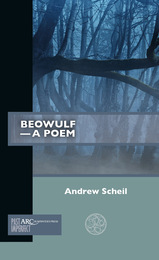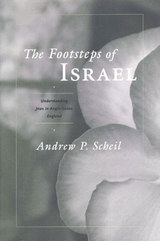2 books about Scheil, Andrew

Beowulf—A Poem
Andrew Scheil
Arc Humanities Press, 2022
Why should anyone, aside from specialist historians and philologists, read Beowulf? This book presents a passionate literary argument for Beowulf as a searching and subtle exploration of the human presence. Seamus Heaney praised Beowulf as "a work of the greatest imaginative vitality": how is that true? The poem's current scholarly obsessions and its popular reception have obscured the fact that this untitled and anonymous 3182-line poem from Anglo-Saxon England is a powerful and enduring work of world literature. Beowulf is an early medieval exercise in humanism: it dramatizes, in varied and complex ways, the conflict between human autonomy and the "mind-forg'd manacles" of the world. The poem is as relevant and moving to any reader today as it was during the early Middle Ages. This book serves both as an invitation and introduction to the poem as well as an intervention in its current scholarly context.
[more]

The Footsteps of Israel
Understanding Jews in Anglo-Saxon England
Andrew P. Scheil
University of Michigan Press, 2004
"This innovative, well-researched study looks at anti-Judaic rhetoric in the Old English and Latin texts of Anglo-Saxon England-a land lacking real Jews. The author isolates a common pool of inherited images for portraying the Jew, and teaches us to hear, especially in the vernacular, their increasingly dark and disturbing inflections."
---Roberta Frank, Yale University
"The Footsteps of Israel is a fascinating study of a pervasive stereotype. Scheil's analysis of how Jews, with no real physical presence in Anglo-Saxon England, captured the imagination of writers of the period, is a superb achievement."
---Louise Mirrer, President and CEO, New-York Historical Society
"The elegance of Scheil's prose weaves a unifying thread through the vast literary and historical tapestry he presents, moving with grace from Latin to Old English, from Bede to later authors, from Wordsworth and Blake to modern writers. He speaks elegantly of these texts' conversations with the past, and the Jews emerge as both enemies and spiritual antecedents of the 'New Israel' of Anglo-Saxon England."
---Stephen Spector, State University of New York, Stonybrook
Jews are the omnipresent border-dwellers of medieval culture, a source of powerful metaphors active in the margins of medieval Christianity. This book outlines an important prehistory to later persecutions in England and beyond, yet it also provides a new understanding of the previously unrecognized roles Jews and Judaism played in the construction of social identity in early England.
Andrew P. Scheil approaches the Anglo-Saxon understanding of Jews from a variety of directions, including a survey of the lengthy history of the ideology of England as the New Israel, its sources in late antique texts and its manifestation in both Old English and Latin texts from Anglo-Saxon England. In tandem with this perhaps more sympathetic understanding of the Jews is a darker vision of anti-Judaism, associating the Jews in an emotional fashion with the materiality of the body.
In exploring the complex ramifications of this history, the author is the first to assemble and study references to Jews in Anglo-Saxon culture. For this reason, The Footsteps of Israel will be an important source for Anglo-Saxonists, scholars of late antiquity and the early Middle Ages, scholars of medieval antisemitism in general, students of Jewish history, and medievalists interested in cultural studies.
---Roberta Frank, Yale University
"The Footsteps of Israel is a fascinating study of a pervasive stereotype. Scheil's analysis of how Jews, with no real physical presence in Anglo-Saxon England, captured the imagination of writers of the period, is a superb achievement."
---Louise Mirrer, President and CEO, New-York Historical Society
"The elegance of Scheil's prose weaves a unifying thread through the vast literary and historical tapestry he presents, moving with grace from Latin to Old English, from Bede to later authors, from Wordsworth and Blake to modern writers. He speaks elegantly of these texts' conversations with the past, and the Jews emerge as both enemies and spiritual antecedents of the 'New Israel' of Anglo-Saxon England."
---Stephen Spector, State University of New York, Stonybrook
Jews are the omnipresent border-dwellers of medieval culture, a source of powerful metaphors active in the margins of medieval Christianity. This book outlines an important prehistory to later persecutions in England and beyond, yet it also provides a new understanding of the previously unrecognized roles Jews and Judaism played in the construction of social identity in early England.
Andrew P. Scheil approaches the Anglo-Saxon understanding of Jews from a variety of directions, including a survey of the lengthy history of the ideology of England as the New Israel, its sources in late antique texts and its manifestation in both Old English and Latin texts from Anglo-Saxon England. In tandem with this perhaps more sympathetic understanding of the Jews is a darker vision of anti-Judaism, associating the Jews in an emotional fashion with the materiality of the body.
In exploring the complex ramifications of this history, the author is the first to assemble and study references to Jews in Anglo-Saxon culture. For this reason, The Footsteps of Israel will be an important source for Anglo-Saxonists, scholars of late antiquity and the early Middle Ages, scholars of medieval antisemitism in general, students of Jewish history, and medievalists interested in cultural studies.
[more]
READERS
Browse our collection.
PUBLISHERS
See BiblioVault's publisher services.
STUDENT SERVICES
Files for college accessibility offices.
UChicago Accessibility Resources
home | accessibility | search | about | contact us
BiblioVault ® 2001 - 2024
The University of Chicago Press









